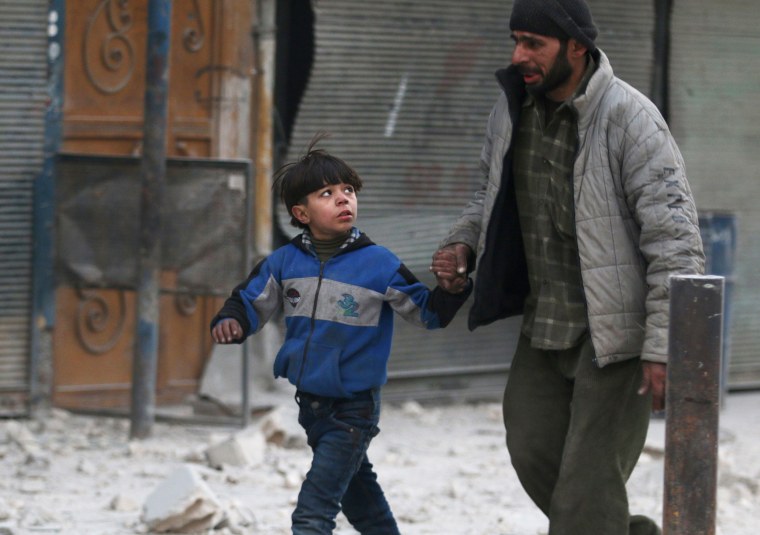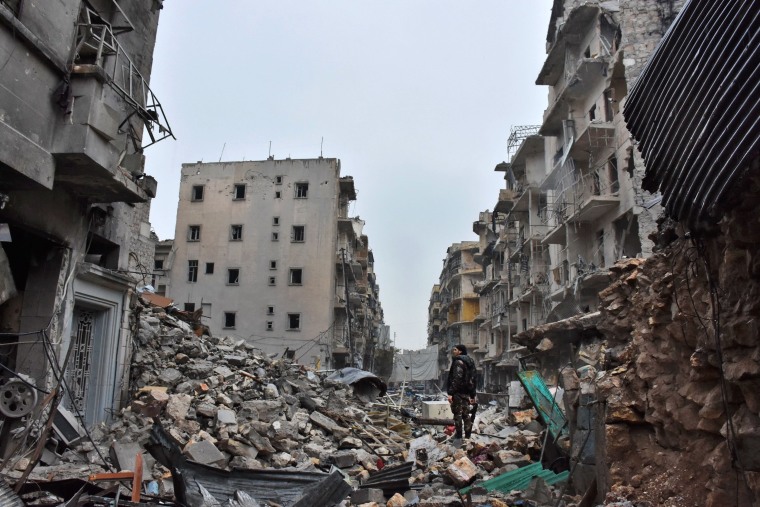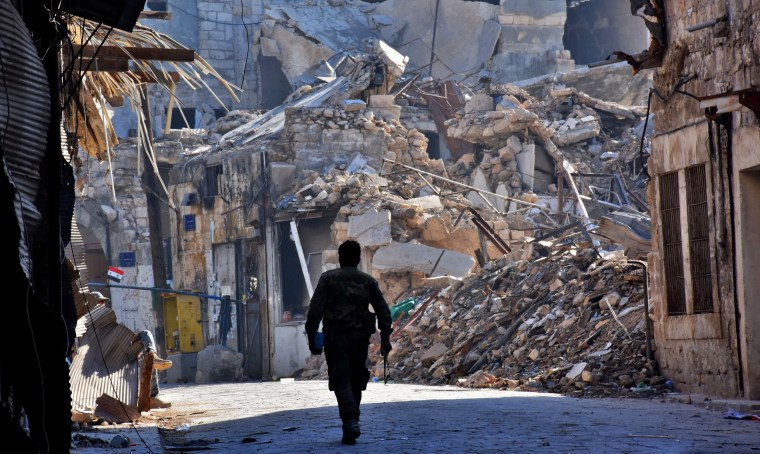A glimmer of hope went out as the guns which were momentarily silent in Syria's besieged Aleppo on Wednesday raged again.
The brief cessation of hostilities, reportedly brokered by Turkey and Bashar al-Assad supporting Russia, was broken with fierce bombings and gunfire.
A planned evacuation of rebels and civilians was also cancelled on the day after the United Nations called the situation in the city "a complete meltdown of humanity”.
Thousands were thought to be trapped in remaining opposition enclaves, which have been besieged since 2012. According to the U.N., around 100 unaccompanied children are believed to be taking shelter in a building and are under fire.
Here’s what we know about what is happening on the ground and what could come next for Syria's suffering civilians, Russia and Assad.
What of the suffering children?
While there is no way to know exactly how many people remain in rebel-held areas, before the recent escalation of violence some 100,000 civilians were thought to be living in the besieged enclaves, according to Juliette Touma of the U.N.'s children's charity UNICEF.

Conditions on the ground had shocked even seasoned international aid workers and observers.
“I’m not sure I have the words to start describe the situation, for children in particular,” Touma said. “When everything that should be safe is no longer safe — like hospitals, like schools, like playgrounds, even your own home �— what’s left?”
Civilians were now especially vulnerable with temperatures dropping and food and medicines running out fast, she said.
Touma called on the international community to exert “collective pressure on parties to the conflict” to end the horror.
“Just pause a minute and think about the children,” she said. “Those who are fighting and supporting [the war] are maybe forgetting that we are talking about children who have been dragged into this awful, brutal cycle of violence.”
Throughout Syria, 1.7 million children are not attending school, she said. About half of the country's population has been displaced.
On Tuesday, UNICEF raised the alarm over the fate of "many children, possibly more than 100, unaccompanied or separated from their families ... trapped in a building, under heavy attack in east Aleppo," citing reports from a doctor on the scene.
The U.N. human rights office has also said it received reports of pro-government forces killing at least 82 people as they tightened their grip on the city.
What is Russia's role in the bloodshed?
While Moscow insists its involvement in Syria is mainly humanitarian, Human Rights Watch alleges that the Syrian-Russian coalition has committed war crimes during a month-long bombing campaign in Aleppo during September and October.
Regardless, the intervention by Moscow Sept. 30, 2015 has been decisive in turning the war in Assad’s favor and against the U.S.-backed rebel forces fighting to unseat him.
Russia’s decision to throw its weight behind Assad — its sole remaining ally in the Middle East — looks to have paid off with rebels on the run throughout the country’s major cities.

Russia's involvement was scaled back in the Spring when many troops were redeployed back home, but President Vladimir Putin’s government is still heavily involved both militarily and diplomatically with Moscow often taking the lead on announcements to the world community.
According to the government, the Russian military stopped bombing in Aleppo on Sept. 18 but has remained involved and deployed its only aircraft carrier to Syria, where it sits off the coast.
Syria is central to Russia’s strategy to break out of international isolation it found itself in after Moscow's involvement in Ukraine triggered harsh international sanctions in 2014.
Russia does not say how many forces it has fighting in Syria.
What next for Assad ... and ISIS
The Syrian government's probable recapture of Aleppo is seen as a pivotal moment for the country's leader.
It leaves Assad in control of almost all major urban areas, and ready to push for a role in the world community's broader war against ISIS militants clinging to parts of Syria's northeast. An assortment of non-ISIS rebel groups is spread around the country and lacks the cohesion and power to challenge Assad.
"The recapture of Aleppo will position Assad to claim that he is Syria's legitimate sovereign ruler and lobby the international community to provide him with support," Jennifer Cafarella of the Washington-based Institute for the Study of War told The Associated Press.
The U.S.'s president-elect could also shake up U.S. policy in the region.
While campaigning, Donald Trump indicated he would be ready to work with Assad as well as Russia.
"I don't like Assad at all," he said during the second presidential debate in October. "But Assad is killing ISIS. Russia is killing ISIS."
His selection of Exxon Mobil CEO Rex Tillerson who has longstanding ties to Russia and Putin only fuels speculation that Trump would work for closer ties with Moscow.
Related: What You Need to Know About The U.S.-Backed Assault on Syria's Raqqa
Assad's desire to reenter the world community will more likely be achieved if he is seen to be actively fighting ISIS. And nowhere is that fight more important than in Raqqa, ISIS' stronghold and the capital of its caliphate.
While opposing Assad, the U.S. is backing Kurdish and Arab fighters in an attempt to seize back control of Raqqa, which the extremists captured in 2014.
But it will not all be smooth sailing — ISIS has re-occupied the central town of Palmyra, which they had been expelled from earlier this year.
It's not just Russia — what about Iran?
Russia blamed the continued violence in Aleppo on Wednesday on the opposition. But civilians and commanders in rebel-held areas contradicted the Russian account, saying the evacuation was scuppered by Iranian-backed forces, which have also been fighting on behalf of Assad.
The Iranians were seeking to ensure the safety of Shiite Muslim populations that are surrounded by the largely Sunni revel forces opposed to the Syrian government.
Iran supports some Shiite militias that are fighting alongside the Syrian army, including the Lebanese Hezbollah group and the Iraqi group Harakat al-Nujaba.
What next for Aleppo's civilians?
Even if the most recent outburst of violence ends with a lasting cease-fire and rebels and civilians are moved out of Aleppo, aid workers and analysts worry that would not spell peace for those fleeing the violence.
Paul Donohoe, a spokesman for the International Rescue Committee, said his organization was extremely concerned about what was coming next.
“Will they find safety in another part of Syria” or will they be “sitting ducks,” he asked.

Under previous agreements, rebels and civilians have been taken to Idlib, a province under the control of the beleaguered rebels. But even there they are not assured safety, Donohoe said pointing specifically to a deadly Oct. 27 bombing of an IRC school in Idlib that killed 22 children and six teachers. Two IRC supported hospitals were also attacked in the province in 2016.
Donohoe added: “Escaping Aleppo doesn’t mean escaping the war. After witnessing the ferocity of attacks on civilians in Aleppo, we are understandably concerned that the sieges and barrel bombs will follow the thousands who arrive in Idlib."
Many of those who have already escaped Aleppo were living in dire conditions. He cited as an example the some 4,000 civilians who had fled Aleppo in the last week who were living in desperate conditions in Aldana, Idlib.
